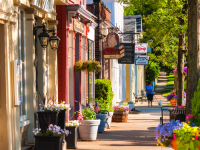
Rosedale, California. Population 15,968 at the time of the last census. Founded in 1881 by a group of mostly Italian immigrants, who noted the temperate climate of Southern California and felt it reminded them of home. Among them was the wealthy and influential De Rosa family, who gave the town its name.
At first glance, it seems like your average mid-tier American city. Cleaner than most, with pretty little residential streets and a robust collection of shops and restaurants.


The city's true character might be likened to a small fiefdom or principality. It is the territory of the De Rosa crime family, who keeps the peace with an iron fist. There's nothing that goes on in town without Cesare De Rosa knowing about it. The police chief is in his pocket, as is the mayor. Businesses pay a modest protection fee or are quickly run out of town.
There's also a Red Light district on the outskirts of the city, on the edge of the border line. It was built specifically so people could get there without having to use the main street (and potentially be seen by their wives or neighbors). It is a celebration of vice, sporting two strip clubs, a casino and several bars. There's a luxury hotel for wealthy out-of-towners, and a cheap motel.

Of course, these establishments toe the letter of the law on paper, but it's an open secret that the hotel is often used for prostitution.















